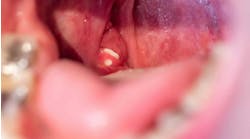Still searching for homeDear RDH:I remember walking across that stage to receive my diploma; the excitement of being a bona fide hygienist was overwhelming, only to be surpassed by the letter which held my license. I remember the months of envisioning my office, my little room, my patients, a loving, kind doctor who respected me and wanted me to be the integral part of his team who oversaw all of his hygiene needs — a home away from home. Six years later, I still do not feel as though I have found my home. I have met hygienists who have been in the same office 10 to 15 years, leaving me to wonder, what's wrong with me? Why can't I find a place where I feel comfortable? Why don't I have a home?
It all started out so simple. My first job was with a large multi-office practice that ran more like an HMO than a fee-for-service office. The benefits looked good at the time. Right from the start, it didn't feel right. But I was too young and inexperienced to know why. Soon after, I took up a second job with a periodontist — the most amazing doctor a hygienist could work for. He was a man who taught the "big boys" at the dental school, had a long list of credentials, acknowledgements, and degrees trailing behind his name. He loved to teach and encourage me; I learned so much from him — things they didn't teach in school. I learned to think for myself and use the education I had received. I learned the value of home care, and I learned the value of quality work. Unfortunately, after only short time with Doctor J., we moved and I had to say goodbye. Looking back, I'd have to say that Doctor J. spoiled me; he ruined me for the rest of my career.
Doctor J. often said, with a smirk on his face, the only reason hygienists were not allowed to diagnose was because doctors have ego problems. On many occasions during exams, as I would very carefully point out a "suspicious area" or a "possible" problem I found while cleaning, he'd say, "Oh come on, that isn't suspicious, call it what it is!" I'd reply with, "I'm not supposed to diagnose." His reply would be, "You took radiology, you took pathology, and pharmacology. What do you think I hired you for?"
Safe in his haven, I was allowed to do the unthinkable. The big "D" word became part of my job description. He relied on my knowledge, pushed me to think and make judgment calls. I learned not every patient will fit nicely into the SRP or prophy categories we like them to be. There is more than probing depths and bleeding indexes to consider when deciding what a patient needs. A lot of assessment goes into a limited amount of time. You can't always run get the doctor to talk it over and decide on the treatment. Sometimes, you just need to think on your own. Doctor J. started this pattern from which I can't seem to deviate.
Home care was of number one importance in Doctor J.'s office. His philosophy was patients had to "earn" their surgery. I remember thinking it was an odd way to do business. The first two appointments after the initial exam were with me, two hours of nothing but home care instructions.
At first, I would apologize to my patients for having to go over the obvious, but soon realized that if they knew how to do this correctly, then they probably wouldn't be here at the periodontist.
Then the most amazing thing happened. I started to see the results. I saw remarkable shrinkage in tissue. I saw subcalculus become supra. I saw some patients actually avoid surgery, just because they were able to get a grasp on their plaque control. Once they proved they could take care of their mouths, and if they still needed it, then they could have their surgery; otherwise, "it's a waste of their money and a waste of my time."
It was not an odd way to do business at all. If patients can't take care of it, you haven't done them any favors. Until that point, I thought the most important thing I could do for my patients was clean their teeth. Now, I knew differently.
I loved to sit in with the doctor during a surgical procedure. I'd kick the assistant out during any downtime I had (she never minded the break), so that I could assist and observe the surgery. It always amazed me at how often a periodontal condition was caused by, or aggravated by faulty restorative and periodontal procedures — overhangs, invasion of the biologic zone, open margins, poorly placed implants, gaudy grafts, etc. I realized that no matter how good the dentist, he will never be quite as good as Mother Nature, but quality work is essential. Every practitioner should be striving to do the kind of work that he or she can be proud of. Not only is it more esthetic and pleasing to the eye, but periodontally, it's imperative.
All of these things shaped me early on in my career. So it's no wonder that I have problems finding a home. I have become very picky and opinionated about where I work and whom I work with. I have never been asked to leave, but I never felt like they really wanted me. Rather, they just needed a hygienist to fill the position. Nowhere else have I found a place where I am allowed to think and make decisions, where I feel like my education is used and pushed to its limits.
I have found many hygienists along the way who are content to just put their blinders on and take their thinking caps off and do nothing but clean all day. I can't do that. Is it possible to have too much knowledge for your own good? To me, it is so clear; I am the periodontal specialist of the general office.
Surely, I'm not the only one who sees that if the doctor attends to the restorative needs of the patient, and I attend to the periodontal needs, the relationship actually complements each other, and the patient benefits. Is that too bold of a statement? Why would you hire a specialist (and I don't come cheap) and not listen to their recommendations or allow them to do their job to the best of their ability?
I'm starting to think my only chance at really being happy at work is to move to Colorado and open up my own shop, or go back to school and become a dentist. I kind of like Oregon and restorative really isn't my thing. What I'd really like to do is find a dentist who needs me ... needs what I know, or what I can do for his/her practice. I want to find a dentist who has a home with my name on it.
Cheryl C. Frazier, RDH
Portland, Oregon
First, let's not compare apples to oranges. There is "rough" and there is "thorough," just as there is "pain" and there is "discomfort." "Rough" is a heavy, clumsy hand flitting haphazardly from one tooth to another. "Thorough" is a sure, steady hand completing a necessary treatment in a professional manner. "Pain" downright hurts. "Discomfort" is unpleasant, but we probably will live through it.
I'd like to think that there is not a hygienist on the face of the earth who would willingly cause "pain" to her patient. But when a "clean mouth" recall appointment is painful, we could think in terms of "rough." (Let's face it; there are a few claws out there.) For more difficult cases (inflammation, subgingival calculus, etc.), "thoroughness" could understandably cause some discomfort. An explanation of the process and the necessity of the treatment can go a long way towards patient acceptance.
Secondly, I've worked in places where administration of local anesthesia by a hygienist is legal, as well as places where it is not. The hard facts of life are that we are much more inclined to use it when needed if we ourselves can turn around, pick up the syringe, and be done with it. If we must go to the boss, he will scowl and grumble about being interrupted "unnecessarily" one more time.
Employers all too often are willing to compromise principles for fear of "losing" a patient. This puts a tremendous pressure on us to keep everyone smiling (pain-free). The bottom line is we are expected to do the job, do it perfectly (or, by George, we'll be sued five years down the line), but with one arm tied behind our backs. Personally, when I know that I am performing a thorough, professional treatment — even if it occasionally involves a little discomfort — and my boss does not back me up, then it's time to look elsewhere.
Ruth Egli, RDH
Strasburg, Virginia
To submit letters to the editor for publication in Readers' Forum, send by:
Mail —
P.O. Box 3408, Tulsa, OK 74101
E-mail — [email protected]
Fax — (918) 831-9804
Signed letters must include the city and state where the reader resides or practices.
In addition, the September issue of RDH published a letter by Dr. Ellis Neiburger that was titled, "Speed it up, girls." Obviously, his letter struck a chord with some readers, and comments about his letter can be found at the some location.





